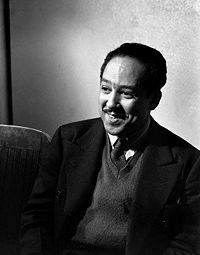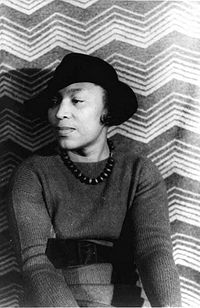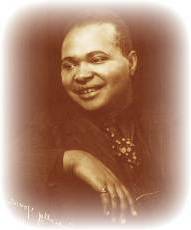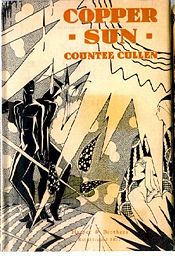| wiki | search |
Main Page | Groups and Assignments | Bios | History | Harlem | Diversity Today | Help
Langston Hughes
The Harlem Renaissance brought along a new creative energy for African American literature. This literary cultural movement was to reject the traditional American standards of writing and discover and utilize their own style of writing to signify their cultural identity. One of the most influential figures during this time was Langston Hughes. His writing consisted of poems, plays, essays, short stories, and more. He often wrote about racial injustice and about the celebration of African American culture and spirituality. To demonstrate this new style of writing, Hughes’ first book of poetry published was entitled The Weary Blues. These poems were written using a mix of jazz and blues with traditional verse.
“And far into the night he crooned that tune.
The stars went out and so did the moon.
The singer stopped playing and went to bed
While the Weary Blues echoed through his head.
He slept like a rock or a man that's dead."
These lines taken from The Weary Blues depict a man playing jazz on the piano and creates a sense of mourning of the music genre, the blues. It makes the reader really appreciate the musician described in the poem. For a fuller experience of the poem, press play to listen to an audio reading of "The Weary Blues" by Langston Hughes below.
"The Weary Blues" by Langston Hughes
Zora Neale Hurston
Another dignitary during the Harlem Renaissance was Zora Neale Hurston. She was the author of the great American novel, Their Eyes Were Watching God, and received much controversy from it during her time. Critics said that her writing was “too black” and did not appeal to white readers because she used a Southern black dialect when writing her book. Some of the major themes delineated in this book were the misery of black people in America, the black autonomy, and the separation between light-skinned and dark-skinned African Americans. Below is an excerpt from "Their Eyes Were Watching God" read by actress Ruby Dee. Press play to listen.
"Their Eyes Were Watching God" read by Ruby Dee
Countee Cullen
Countee Cullen differed from the other Harlem Renaissance writers in that he grew up in a predominantly white neighborhood. He was adopted at age 15 by Reverend Cullen, the pastor of the largest African Methodist Episcopal church in Harlem. He attended DeWitt Clinton High School, then a prestigious high school with the majority of the student population being white, followed by New York University. During his attendance at both institutions, his poems were published in school and national publications in addition to winning several literary awards. Continuing his fine education, in 1926 he went on to Harvard University to earn his master’s degree.
Cullen’s most popular poem written during this period is “Heritage,” from his poetry collection Copper Sun. His writing style was lyrical because he believed that a poem needs to have a meter in order for readers to understand the poem. In his poem “Heritage,” he tries to relate his faith to his racial identity. He uses beautiful descriptions of nature to delineate what he is feeling. He essentially denies any connection to his African homeland which today is recognized as “internalized racism.” Below is an audio reading of "Heritage" by Countee Cullen.
"Heritage" by Countee Cullen




